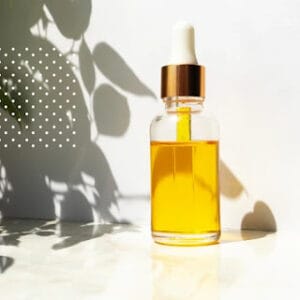Vitamin E for Skin
Introduction
Vitamin E is a powerhouse nutrient known for its remarkable benefits for skin health. As a potent antioxidant, it protects the skin from damage, promotes hydration, and accelerates healing. Whether used in serums, oils, creams, or capsules, Vitamin E plays an important role in maintaining soft, youthful, and glowing skin. This article explores the benefits of Vitamin E for the skin, its different forms, and how to incorporate it into your skincare routine effectively.
What is Vitamin E?
Vitamin E is a fat-soluble vitamin essential for skin nourishment and protection. It works as a powerful antioxidant that helps neutralize free radicals, harmful molecules that contribute to skin aging and damage. Found in various natural sources such as nuts, seeds, vegetable oils, green leafy vegetables, and fish, Vitamin E is important for overall skin health.
Apart from dietary intake, Vitamin E is widely used in skincare products due to its moisturizing, anti-aging, and healing properties.
Benefits of Vitamin E for Skin
Deep Moisturization
Vitamin E is an excellent emollient, meaning it helps lock in moisture and prevent dryness. It strengthens the skin barrier, reducing water loss and keeping the skin hydrated, soft, and supple.
Anti-Aging Effects
As a potent antioxidant, Vitamin E protects the skin from premature aging by combating oxidative stress. It helps reduce fine lines, wrinkles, and sagging, promoting collagen production for firmer, more youthful-looking skin.
Scar and Dark Spot Reduction
Vitamin E aids in skin regeneration by speeding up cell turnover. This helps fade acne scars, pigmentation, and stretch marks, leading to an even skin tone and improved texture over time.
Protection Against Environmental Damage
Vitamin E acts as a protective shield against pollution, UV radiation, and environmental toxins. While it is not a substitute for sunscreen, it enhances the skin’s ability to withstand damage from the sun and external aggressors.
Soothing and Healing Properties
Vitamin E possesses anti-inflammatory properties, making it effective in calming irritation, redness, and sensitive skin conditions like eczema and psoriasis. It also helps heal minor burns, cuts, and wounds more quickly.
Different Forms of Vitamin E for Skin
1.Vitamin E Serum
It is a concentrated formula designed for quick absorption into the skin. It is often combined with other antioxidants like Vitamin C and hyaluronic acid to boost hydration and brightening effects.
Benefits:
Hydrates without leaving a greasy feel.
Repairs damaged skin and even out skin tone.
Reduces the wrinkles, fine lines, and dark spots.
Works well with sunscreen for UV protection.
How to Use:
You can apply a few drops to clean, damp skin before moisturizing.
Use it morning and night for best results.
Pair with Vitamin C serum in the morning for enhanced protection.
2.Vitamin E Oil (Rich and Deeply Nourishing)
Vitamin E oil is a thicker, more concentrated form ideal for dry and damaged skin. It is often derived from wheat germ, sunflower, or almond oil.
Benefits:
Provides intense hydration and prevents flaky skin.
Helps heal scars, wounds, and stretch marks.
Soothes sunburn and inflammation.
Works as an overnight skin repair treatment.
How to Use:
Mix a few drops with your moisturizer for daily hydration.
Apply directly to scars, dark spots, or dry patches.
Use as a lip balm to heal chapped lips.
Massage into cuticles and nails to strengthen them.
Tip: If you have oily or acne-prone skin, use Vitamin E oil sparingly to prevent clogged pores.
3.Vitamin E Capsules (For Internal and External Use)
Vitamin E capsules are dietary supplements that support skin health from within. They can also be used topically by puncturing them and applying the oil directly to the skin.
Benefits:
Fights oxidative stress for healthy, glowing skin.
Boosts collagen production for firmer skin.
Helps heal acne scars and hyperpigmentation.
Strengthens the skin’s barrier to prevent moisture loss.
How to Use:
Take orally (consult a doctor for the right dosage).
Apply the oil from a capsule directly to scars or dark spots.
Mix with moisturizer or serum for enhanced hydration.
4.Vitamin E Cream (Everyday Moisturizer)
Vitamin E cream is an easily absorbable formula ideal for daily use. It often contains shea butter, aloe vera, and jojoba oil for extra nourishment.
Benefits:
Provides long-lasting hydration.
Works as a daily anti-aging cream.
Protects against dryness and irritation.
Strengthens the skin barrier and keeps it resilient.
How to Use:
Apply morning and night after cleansing.
Use a thicker layer at night for overnight hydration.
Apply to hands, elbows, and knees for extra moisture.
How you can incorporate Vitamin E into Your Skincare Routine
Morning Routine:
Apply a Vitamin E serum before moisturizer and sunscreen.
Night Routine:
Use Vitamin E oil or cream for overnight hydration and repair.
Targeted Treatment:
Use capsules on scars and dark spots.
Mixing with Other Products:
Combine Vitamin E with Vitamin C for brightening effects.
Precautions & Side Effects
Avoid excessive use, as too much Vitamin E can clog pores and cause breakouts.
Always do a patch test before applying Vitamin E oil to sensitive skin.
Consult a doctor before taking high-dose Vitamin E supplements, especially if on medication.
Conclusion
Vitamin E is a skincare essential that hydrates, heals, and protects the skin. Whether you choose a serum for daily hydration, oil for deep nourishment, capsules for internal and external use, or cream for everyday moisture, Vitamin E can transform your skin health. Consistency is key, incorporate it into your routine and enjoy the glow, softness, and youthful skin that comes with it.


